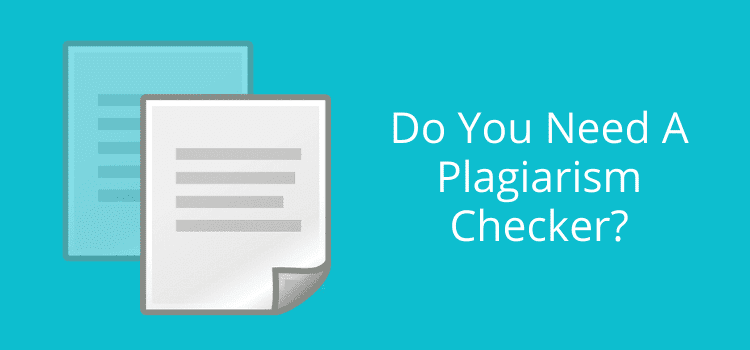
Before you publish anything online, it’s a good idea to choose from a range of free plagiarism checkers to check your text.
You’re writing original content. But some parts of what you write might be duplicate content or accidental plagiarism. It isn’t the same as copied content, though.
If you use a plagiarism detector, you can edit or change certain sentences and phrases. You could use a sentence paraphrasing tool if you need to be sure that your content is unique.
If you are writing blog posts and articles, uniqueness is an essential factor for SEO and search engine traffic.
What is plagiarism?
Cambridge Dictionary defines it as the process or practice of using another person’s ideas or work and pretending that it is your own.
The word derives from the Latin word plagiarius, which means kidnapper.
Meridian-Webster gives two definitions of the verb to plagiarize.
1. To steal and pass off (the ideas or words of another) as one’s own: use (another’s production) without crediting the source.
2. To commit literary theft: present as new and original an idea or product derived from an existing source.
I’m sure that these definitions don’t apply to you.
If you happen to plagiarize content, it is usually by accident and for common phrases.
You can avoid unintentional plagiarism and this possibility by checking your new texts with an online tool that compares your text to already published texts.
But some people cheat. A plagiarism-detecting tool can help you track anyone who might have copied your published content.
Some time ago, I came across a blatant case by one blogger. He had copied and published an entire blog post and the images. One of my plagiarism checkers brought the errant blogger undone.
Why should you check for plagiarism?

There are billions of pages of content on the Internet today.
Writing original content is the best way to rank on search engines and provide unique content for your readers.
I’m sure you use your own words when you write an article or blog post.
But some phrases and sentences might have been written elsewhere.
It is always better to check.
If necessary, edit your text to make it 100% original.
Another reason to check is to look for the possibility that your published content has been copied and re-used.
Content scraping is becoming more common, and there are many sites that are publishing copied content.
If you find this happening, you can contact the blog owner and ask for your content to be removed.
Your other choice is to ask for a credit or backlink.
It is a positive move on your part because gaining backlinks from plagiarism can help your content rank better.
Another reason is to check and make sure that you have cited any quotes you used in your text.
A good checker should find any that you may have missed.
How to detect plagiarism
The easiest way to do a test is to use online tools to check any new content you write.
It’s best to do this before you publish, but you can do it later.
It is a good habit if you are a freelance writer, content article writer, or blogger.
There are a lot of paid and free online checkers. The one you decide to use will depend on your needs.
Free tools are ideal for short texts of up to 1,000 – 2,000 words.
If you are writing a novel, a research paper, or an academic paper, you might want to consider a premium tool.
But you have a few good choices for free plagiarism checkers that can deliver reasonably accurate results.
Another possibility is to use free browser extensions.
You can find a few checkers in the Chrome Web Store. However, you can only check published content with these tools.
The 6 best free plagiarism checkers
I tested over 25 of the most popular checkers I could find using a Google search.
For each one, I used two texts—one of 500 words and a second of 1,500 words.
One text is published, and a detector should find a high degree of copied content.
The second text is unpublished, and it should show no plagiarized content.
Except for Grammarly, all the tools I tested were free to use.
Many of the tools I tested were not useful, and some even failed to provide a result.
Most were using the Grammarly API and limiting the results to 300 words or fewer.
A lot of sites use free checkers as a way to market other products and services.
Most of them asked for an email address before delivering a result, so I have excluded many of these from my list.
In my tests, a handful of sites performed well, and you can do a check (mostly) without obligation. However, some tools in my list require an email address or a Google login.
1. Small SEO Tools (Free)
For a free online plagiarism check, the Small SEO Tools checker worked quite well.
It is limited to 1,000 words per check. But if you copy and paste your text in chunks, you can check a long document.
I had no problem conducting a few tests in succession.
What I liked best was that it gave me the matched sources.
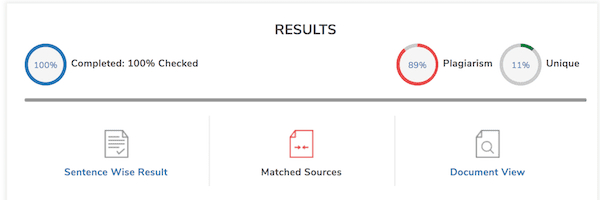
The text I used was an article I wrote some time ago.
The results found the web page addresses for three locations where it was published.
It found results on my site, Medium, and one other site where it was published with my permission.
2. EduBirdie (Free)
When I checked my two texts with EduBirdie, the results were fast and accurate.
Not only that, but it accepted my longer text with no restrictions with the free tool.
It found instances of my published text and gave me a friendly popup to tell me.
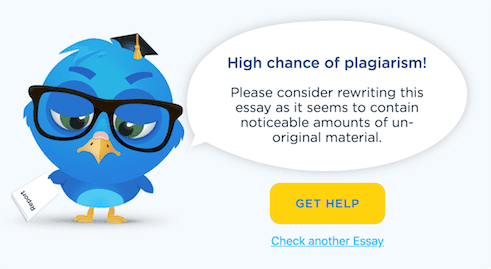
If you want a quick, easy, and reliable free plagiarism checker, this might be the best one for you.
3. Search Engine Reports (Free)
It might not sound like a name you would associate with checking your content for originality.
But the checker on Search Engine Reports is very good indeed. However, expect it to take a minute or so for your results.
It has a generous limit of 2,000 words, and it processed both of my texts. I liked the layout of the report table.
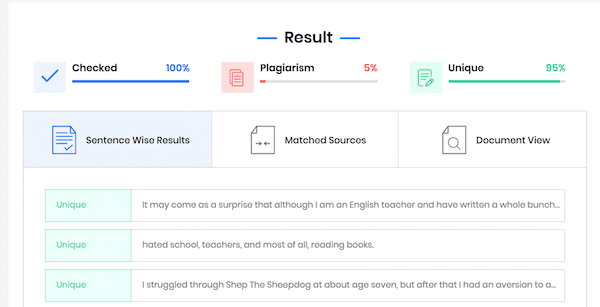
It breaks your text into unique and original sentences.
That’s a great way to check every sentence in your text. Then, you can rewrite sentences that appear elsewhere.
4. Quetext (Free)
When I tested the free version of Quetext, it processed both of my test documents.
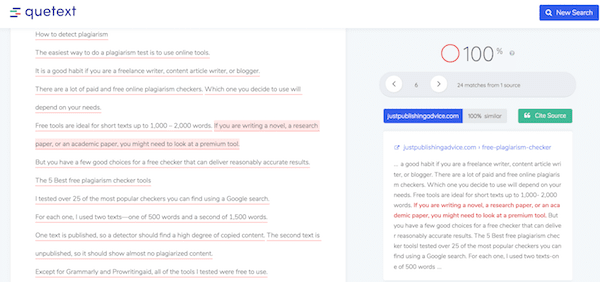
However, for my longer text, it only checked the first 500 words.
It was a little slow at about 30 seconds to give the results. But the results were reasonably accurate.
5. Duplichecker (Free)
While the site is overloaded with ads, Duplichecker is a useful tool.
You get a generous limit of 1,000 words for a free check.
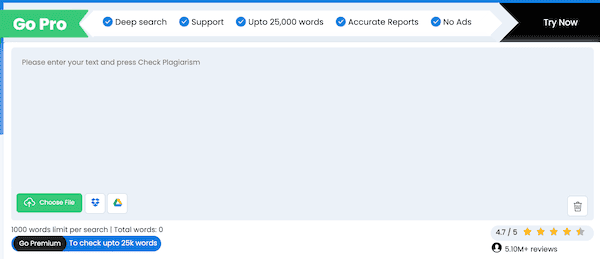
However, it does take quite some time to complete a check, so you need to be patient.
Even if it is a little slow, in my tests it was reasonably accurate, including links to copied content.
6. Grammarly (Free with your subscription)
Many writers use Grammarly to do a thorough grammar check.
But if you are a premium user, high-quality plagiarism checking is included for free in your subscription. However, the plagiarism checker is not easy to find. You may have missed it.
I had been using Grammarly for months before I noticed it. Maybe you should check.
You can find the tool button in the bottom right-hand corner of your online or desktop editor screen.
It’s small, so you need to know where it is hiding.

But once you find it, the results of a check will only take a few seconds. And it will be extremely accurate.

Without a doubt, it’s one of the best plagiarism checkers you will find anywhere.
Which one is the best of these free plagiarism checkers?
EduBirdie is miles ahead of the rest for a totally free option and is the best one I could find.
It has a generous word limit, and the results are very good.
Of all the free plagiarism checkers, I think this one is the most ideal for students.
But I would give second place to Search Engine Reports for a free check.
However, if you already have a Grammarly subscription, you have access to the best.
You have no limitations, and the results are fast, accurate, and reliable.
Summary
In researching this article, I tried and tested more than 25 different checkers.
Most of them performed poorly or not at all.
Many of them are hooks for paid writing and essay services, so don’t waste your time.
There are many paid checkers available. But they are all attached to premium grammar checkers.
It is not worth paying for these if you already have a grammar or writing checker.
In the end, after hours of testing, I can only honestly recommend the six options I listed above.
Should you check your writing for plagiarism? Yes, of course, you should.
But make sure you are using a reliable tool to check.
Related reading: Free Online Writing Tools For New Writers And Students
Share This Article


